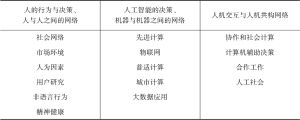章节
社会计算的内涵与前瞻
摘要
社会计算近年来已获得学术界和产业界的高度关注。本文首先通过梳理社会计算的历史与学科发展,界定社会计算的核心概念,厘清“社会计算”与“计算社会科学”的差异,比较国内与国际研究的侧重点。接着,本文介绍社会计算的研究主体、前沿研究领域,以及随着社会、经济与技术的发展,“社会”与“计算”两方面彼此促进的过程。在此基础上,本文展望社会计算未来的发展趋势,认为社会计算作为跨学科领域,将受益于多学科领域间的对话和持续增长的社会大数据,发展出更多样化的研究工具和更丰富的研究内容。
作者
万怡 ,清华大学社会学系博士研究生。
郑路 ,清华大学社会学系副教授。
罗家德 ,清华大学社会科学学院教授、公共管理学院教授,博士生导师,清华大学社会网络研究中心主任,清华大学社会科学学院信义社区营造研究中心主任,中国社会学会社会网与社会资本研究专业委员会创会主席,中国管理现代化研究会组织与战略管理专业委员会副理事长。在学术领域着重于社会网理论研究、大数据中的社会网分析、自组织过程研究,并将中国社会的“关系”与“圈子”等特质置于中国本土化管理研究之中。组织信义社区营造研究中心在汶川地震受灾乡村以及北京大栅栏地区从事可持续发展的社区试验,并举办相关培训。著有《中国人的信任游戏》《复杂:信息时代的连结、机会与布局》《中国治理:中国人复杂思维的9大原则》《灾后重建纪事:社群社会资本对重建效果的分析》《云村重建纪事:一次社区自组织实验的田野记录》《社区营造的理论、流程与案例》等。
吴国炜 ,清华大学社会学系博士研究生。
检索正文关键字
章节目录
-
一 社会计算发展现状
- (一)什么是社会计算
- (二)社会计算主要内涵
-
二 社会计算的发展格局
- (一)研究主体
- (二)研究领域
- (三)社会与计算的相互增强
- 三 未来发展趋势与展望
查看更多>>>


